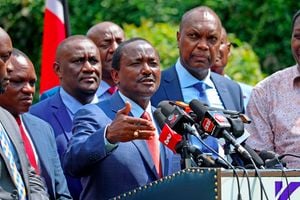You can’t tax everything and anything, judge tells KRA on club membership fees

Clients seeking services at KRA headquarters, Times Tower, Nairobi on February 23, 2024.
The High Court has blocked the Kenya Revenue Authority (KRA) from demanding a 16 per cent Value Added Tax (VAT) on annual subscription and entrance fees from golf and sports clubs.
Justice Nixon Sifuna dismissed an appeal by the KRA that sought to overturn a decision blocking the taxman from demanding the fees.
The judge said that while taxes are an inevitable and legitimate source of government revenue, the KRA cannot tax everything and anything.
“There must be and exist a legal and rational basis for each tax or tax stream. Taxation cannot be by sheer caprice or whim for the mere sake of taxing or for no reason at all,” he said.
The KRA Commissioner for Domestic Taxes wanted the court to overturn a March 2020 decision by the Tax Appeals Tribunal, blocking the taxman from demanding the tax from four golf clubs in Kiambu County.
The taxman argued that the clubs are not open to everyone and one must pay to become a member through registration and subscription fees.
The court heard that the services offered to members by the clubs are paid for using subscription and entrance fees, hence making it a taxable supply.
The taxman maintained that the clubs are not philanthropic entities but businesses and explicitly outside the VAT exemption.
Sigona Golf Club, Thika Sports Club, Kiambu Golf Club, Ruiru Golf Club, and Kenya Golf Federation had opposed the appeal, arguing that KRA has absolutely no legal or factual argument towards charging VAT on club entrance and subscription fees.
KRA had demanded more than Sh40 million from the clubs for 2015 and 2016.
Changed the tune
The court was informed that the Commissioner of Domestic Taxes clarified in 2013 that the fees cannot be subjected to VAT but changed the tune in 2017 and demanded payments.
According to the clubs, the services offered to members are meant to ensure they actualise their hobbies and engage in various leisurely activities.
“The mere fact of requiring members to pay subscription fees does not turn the clubs into business entities or organisations undertaking their activities as a business,” the clubs said.
The court was informed that the subscription fee is paid periodically for members to continue enjoying certain rights and privileges as well as facilities and services in the clubs.
Golf and sports clubs were exempted from VAT on membership and entrance fees until 2017 when the KRA sent them tax demands.
The clubs said they are welfare organisations as opposed to profit-making entities and the fees charged do not make them business entities whose collections are subject to tax.
The judge said the notice issued in 2001 was clarifying an already existing exemption and that it created a legitimate expectation by assuring the clubs that they will continue to enjoy the exemption.
The judge further said the VAT Act of 2013 did not impose VAT on the clubs' entrance and subscription fees or withdraw the exemption.
“That is why even after the enactment and entry into force of the Act, golf and sports clubs continued enjoying the expectation and the tax authority never demanded VAT on the subject fees,” Justice Sifuna said.
The judge said while the court will facilitate legitimate collection of tax for the economy, at the same time, it has the responsibility to guard against overzealousness, greed, unfairness and unconscionableness in tax collection.





